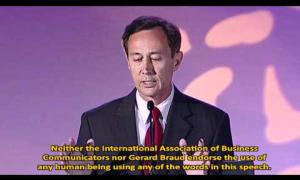How to Write Wedding Speeches for Others
June 28, 2018
I wrote 500 wedding speeches. I learned five things. Over and over and over again.
Ah, the infamous wedding toast. It’s that magical moment in the evening where “Party Pete” from college reminisces about the “Kegolition” from ’05.
After Pete, it’s usually “Inside Joke Jenna” who references that Sex & The City marathon weekend and why Carrie & Samantha were just like the bride and maid of honor because of that one episode where…
You get the point. And yes, I’m probably being a little cynical.
The truth is, when I co-founded Laugh Staff five years ago, I had no idea how much I would learn about people, egos, storytelling, humor, and responsiveness from best man and maid of honor speeches.
Every speechwriter I’ve met deals with these challenges. Here are five things I’ve learned from writing speeches from everyone to “Party Pete” all the way to “Inside Joke Jenna.”
1. Everyone has the best story. It’s like the old Dale Carnegie quote about remembering someone’s name. “A person’s name is to that person, the sweetest sound in any language.” The same goes with stories. A speaker’s story is to that person, the sweetest and most entertaining story in any language. When best men and maids of honor share their stories with me, they’re looking to use that story to entertain or inform. As speechwriters, it’s our job to tell that story in the most beautiful way possible. If someone is comfortable sharing a story with you, and paying you to help tell it, realize how special of an investment that is. Honor the stories. Even the bad ones.
2. Egos are real. Speechwriters are often in a peculiar situation as the ‘man (or woman) behind the curtain’. Most of us are writing for very proud and high profile people. When you send someone a speech and they reply back with enthusiasm and gratitude, it’s always the best practice to downplay your contribution and praise theirs. Something I say often is: “You gave me great stories to work with, I just helped connect the dots” or “Thanks for giving me so much great material to work with. The story about the port-o-potty had me rollin’!” Make the speech giver feel like they did 75% of the work, all you did was help bring it home.
3. Humor is a balancing act. I did stand-up on a part-time basis for a few years and learned a ton. It was my Uber before there was Uber! With Laugh Staff, people expect funny since it’s in our name. But how do you deliver funny content in a universal way, especially when humor can be so subjective? It’s twofold: First, you have to write clearly enough to where people understand it. Second, you have to include humor that shows the value or ‘wink’ that only the seasoned speechwriter can write. One thing that has helped me is to visualize the best man or maid of honor reading the speech on their phone. When I hit ‘send’, I want the speaker to feel like a present arrived in their inbox. The subject line always has an exclamation point at the end, i.e. “John’s Speech!” Or “Cassie’s Maid of Honor Toast!” When the person is reading the speech for the first time, I want two things to happen: 1. I want them smiling as they read it. 2. I want them to snort, chuckle or LOL at least once! The right amount of humor is a tough thing to tackle, but if you keep your speaker in mind (and their ego and personality), you should find that sweet spot of comedic gold.
4. Responsiveness is key. People just want to be heard and acknowledged. With speechwriting, responsiveness is even more crucial because speechwriters are selling an intangible product. When a client e-mails you, give them some concrete answers. One thing I do is set a deadline for myself in the reply. “Dave, I’ll send you the first draft before noon on Tuesday.” The client knows you’ve heard them, and now they can look forward to the draft by a certain time and date. Harry Beckwith, author the book Selling The Invisible, knows precisely how skeptical clients of service providers can be. “Most prospects cannot evaluate expertise, but they can tell if the relationship is good and if the phone calls and e-mails are returned. Clients are experts at knowing if they feel valued."
5. Remind people of your skill. As speechwriters, we’re service providers. Nobody really has to hire us so it’s our job to stay relevant with guest blogs, posting client reviews, and a website with writing samples. I know most of us know this already, but since we’re not selling craft beers or vintage t-shirts people can’t taste or wear or expertise. Make sense? Social Media consultant Mark W. Schaefer hits the nail on the head. “Not everyone can become famous, but just about anybody can become ‘known’. It’s a concoction of presence, reputation and authority.”
OK, that’s all I got for now. “Party Pete” and I got happy hour to get to.
Josh Womack is the co-founder and head writer of Laugh Staff, a team of comedians who write humorous wedding speeches. He also writes keynotes, commencement speeches and his phone number on bathroom stalls.


